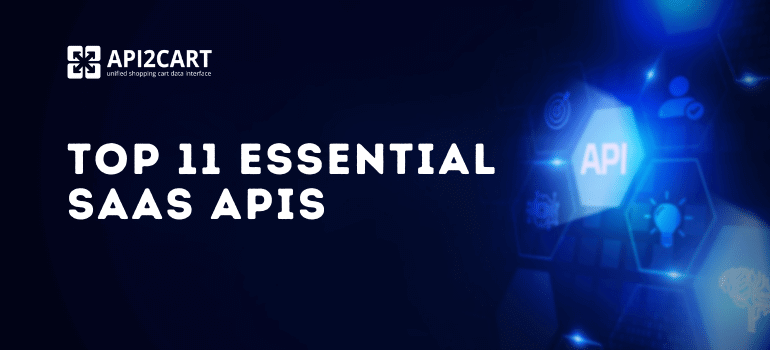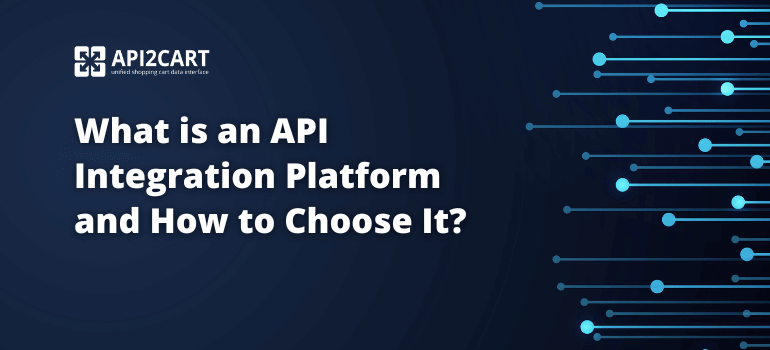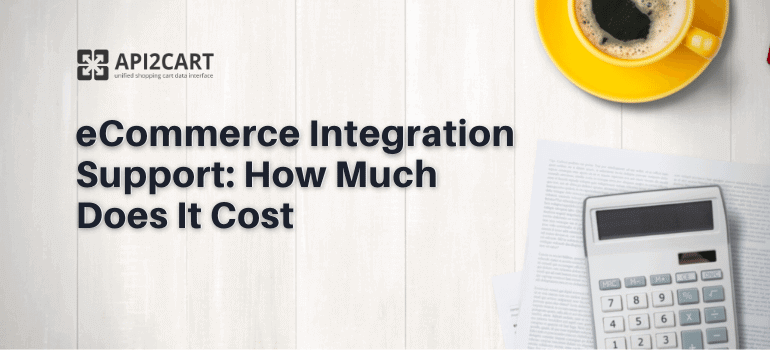
Application Programming Interfaces or APIs are often regarded as the messengers that receive user requests and deliver the system's response for these requests in an automated manner. APIs are therefore necessary to integrate various operations, functionalities, and systems.
When the same APIs are used as messengers in an eCommerce platform, they are called eCommerce APIs. As one can imagine, any eCommerce business is subject to thousands of requests, orders, purchases, etc. Thus, the centralization of all this data is essential, which is supported by advanced eCommerce SaaS APIs. Therefore, in this article, let us take a look at the top 11 essential SaaS APIs.
List of Top 11 SaaS APIs
- BigCommerce API
- WooCommerce API
- Shopify API
- Ecwid API
- Lightspeed API
- Magento API
- Salesforce Commerce Cloud API
- 3dcart API
- Squarespace Commerce API
- X-Cart API
- API2Cart API
BigCommerce has a few various APIs that allow managing store data, authenticating customers, making client-side queries for product info, etc.
BigCommerce REST APIs respond efficiently in real-time to allow users to remain abreast with all events in BigCommerce e-stores. The usage of such APIs enables users to add new products and update the existing ones in a store, modify order statuses, create coupons, etc.
BigCommerce API accepts requests and sends the responses in JSON format.
WooCommerce operations can be streamlined and controlled using its API.
All information related to product lists, orders, shipments, etc., can not only be accessed but also be updated or deleted using WooCommerce REST API.
WooCommerce API allows users to filter relevant items, update inventory data, reserve stock for the future, and perform many other business tasks from one centralized data portal itself. The WooCommerce API is subject to regular updates and upgrades, so you have to install and learn how to use the newer versions of the API quite frequently.
Shopify API comes with a variety of features, enabling users to customize and manage store data in a much easier way.
Like other advanced SaaS APIs, the Shopify API provides options dealing with data related to products, reviews, shipments, orders, customers, etc. Moreover, it is an API that supports HTTP command requests like PUT, POST, DELETE, etc.
Shopify API supports both XML and JSON formats.
Nowadays, more and more eCommerce software vendors are becoming interested in developing the integration between their systems and Ecwid API. It is because of the increasing popularity of the Ecwid platform.
Ecwid API is one of the most secure ones in the market today, and it works on the oAuth2 authentication model. Besides helping with the management of regular store data, the Ecwid API is also beneficial in customizing the storefront and adding new interfaces to the control panel.
The Ecwid API uses a REST interface that helps to store and access data related to store profiles, categories, products, etc. The best part is that it allows integration of other applications, such that they eventually work as native features of the Ecwid app itself.
Lightspeed API provides access to all operation end-points. Lightspeed API uses the OAuth2 protocol for authentication and for getting access to the API.
Similar to other common SaaS APIs, the Lightspeed API works on HTTP requests and has two main read methods. It can be used to add, delete, or edit records. Users can make requests using XML or JSON formats with the Lightspeed API.
An API of another fast-growing shopping platform, the Magento API, supports both JSON and XML formats. Like other APIs on the list, it works with the primary HTTP inputs, allowing users to access, change, or delete data related to sales, customers, and deliveries.
However, Magento doesn't work with a REST approach alone. Magento has both SOAP and REST APIs, respectively. This is the reason why the Magento API enables users to comprehensively communicate between different operational categories. Since the API works with XML format as well, most of the communication is through XML-RPC clients.
An Open Commerce API for the B2C commerce platform, the Salesforce Commerce Cloud API is an advanced REST API that integrates the store functions and tasks seamlessly.
Users get to use three types of SaaS APIs. The first is the Shop API that guarantees easy access to the Cloud-based storefront data. The second is the Data API, which helps in providing access to data for digital application configuration and integration. The third one is the Meta API which gives you access to the descriptions and documentation of the formal resources.
3dcart API can be used by software developers after registering on the official Developer Portal. The API access is secured with a pair of public and private keys. The keys allow clients to access the service rendered by the vendors or developers.
3dcart REST API supports Basic and Oauth methods of authentication.
With a REST approach, the 3dcart API interestingly provides some OData standard functionality as well. Thus, requests like SELECT and ORDERBY can be processed by the API. Besides this, the regular HTTP method responses like PUT, DELETE, etc., can also be used with the API. The 3dCart API supports a maximum of 50 requests, at a rate of 2 requests per second, making it one of the most scalable SaaS APIs.
Squarespace Commerce API provides multi-dimensional functionality.
Squarespace Inventory API makes it easy to read and edit the product data. Orders API gives an overview of all active orders as well as the completed orders summary. Products API helps you manage the product lists and images, whereas Profiles API is a window to access the customer profiles alongside their order history and search patterns. Lastly, Transaction API gives access to transaction history data.
Squarespace Commerce APIs are built on HTTPS. Also, they are designed with REST principles.
X-Cart API allows you to retrieve or exchange data with X-Cart seamlessly. Like all other eCommerce APIs, the X-Cart API also works on basic HTTP methods of GET POST, PUT, DELETE. All requests have to be passed on in a JSON format to receive an adequate response through the X-Cart API. The default format and Complex schema format are the two data schemes that the X-Cart API supports.
API2Cart API supports integration with not just one but more than 40+ popular shopping platforms, including Shopify, Magento, WooCommerce, etc. The API utilizes all methods to help users manage, access, and modify shopping platforms’ data. The API provides developers access to all major end-points in the storefront, thereby reducing the cost of establishing single point-to-point connections, which are extremely tedious and difficult to monitor.
API2Cart API is a unique unified API that can seamlessly integrate your eCommerce software or app with all popular platforms at once. The open-source platforms that are supported by this API include Magento, WooCommerce, Ecwid, OpenCart, and many more. On the other hand, the list of closed source shopping platforms supported by the API2Cart API is 3dcart, BigCommerce, Shopify, etc. The API even supports the integration with larger online marketplaces like Amazon, eBay, Etsy, Walmart, etc.
API2Cart API allows users to access data related to products, customers, orders, product variants, attributes, past transactions, categories, and much more.
It is possible to try to use API2Cart unified API functionality for 30-days for free. All you have to do is to book a demo now and register your account with the help of our specialist.



